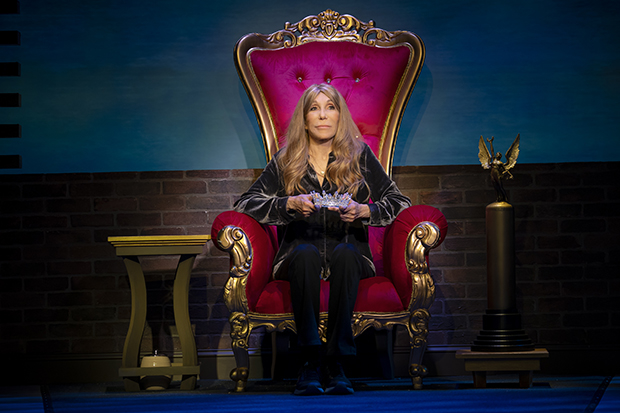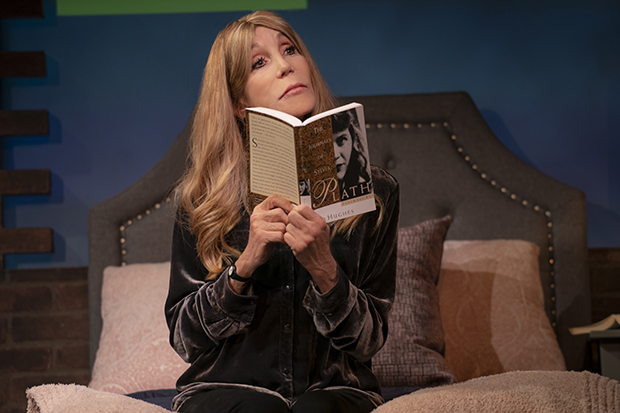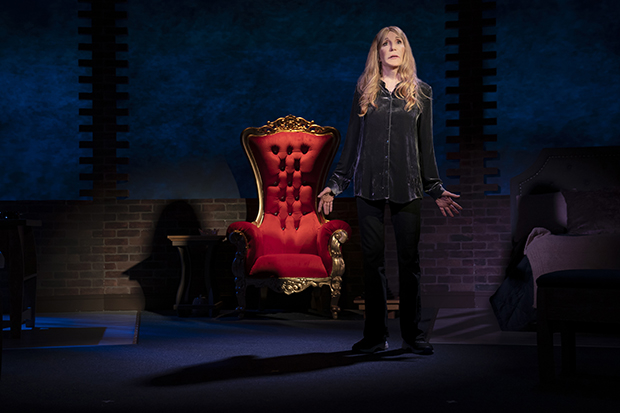Miss America's Ugly Daughter Dishes on a Beauty Queen's Private Cruelty

(© Joan Marcus)
Barra Grant has a lot of memories about her mother, beauty queen Bess Myerson — and they're not very pretty. Audiences at the Marjorie S. Deane Little Theater at the West Side YMCA can hear several of them in Miss America's Ugly Daughter, which seems to be part of the Y's ongoing series of confessional solo shows by the traumatized children of famous New Yorkers.
And make no mistake, Myerson was famous in her day: She was the first (and to date, only) Jewish winner of the Miss America pageant, taking her crown in 1945, just as the full horrors of the Holocaust were coming into public view. Her victory was a huge morale boost for Jewish Americans, and she continued to speak out for Jewish causes for the rest of her life. She parlayed her title into regular television appearances, a job as New York City's first commissioner of consumer affairs, and an unsuccessful run for the US Senate.

(© Joan Marcus)
Grant moves considerably beyond Myerson's official bio to present the perspective of a harassed daughter who can never quite live up to the unrealistic demands of her mother — and as Grant tells it, Myerson was a real mother. She frequently criticized her daughter's appearance, at one point telling her how fat she had gotten (Grant was nine months pregnant at the time). Despite amassing a small personal fortune, she had the unsavory habit of pilfering toilet paper from restaurants and blankets from airplanes, occasionally regifting the latter. That activity proved to be a gateway to more serious behavior: Myerson pleaded guilty to shoplifting charges in 1988.
"I'm passing some new consumer laws for poor people. That's almost like paying for dinner," she once said as she passed the bill off to Myerson's struggling actor friends. Even after Grant moved all the way across the country, Myerson would still menace her with late-night phone calls in which she would monologue about her favorite subject: herself. It's a rare thing that the author and star of a solo show emerges as the least narcissistic character in the play.
Even so, director Eve Brandstein delivers a production that falls back on solo-show tropes. Elisha Schaeffer's overcrowded set features way more furniture than is actually necessary to tell this story. Tom Jones's triptych of stylized projections gives us more than enough. Yael Lubetzky lights a central throne (which looks like it was stolen off the set of an MTV dating show) to denote Myerson's presence in the room, but we only ever hear her voice broadcast over the sound system (Anna Holbrook voices Myerson with a razor blade concealed in every syllable).

(© Joan Marcus)
The strangeness of having the performer act opposite a disembodied voice is only exacerbated by the qualities of this particular performer: Grant is not a natural stage talent, moving stiffly around the set with her arms lightly raised from her sides, like a sad marionette. Her dance interludes are mesmerizing in their ethereal dearth of rhythm. While Grant's diction is clear, a pall of sadness envelops her voice on almost every line. "You see, my mother was a daughter of the Depression. The Great One. I am merely greatly depressed," she intones like a lady Eeyore. That's not to say there aren't moments of high drama: "No. Please! Please don't cut off my hair," she pleads with her invisible tormenter like Christina Crawford peering helplessly into the mirror.
While Miss America's Ugly Daughter never attains the dizzyingly high camp of Mommie Dearest, it does land in a more thoughtful place, with Grant placing her mother's awfulness in the context of a chain of mother-daughter emotional abuse passed down through the generations, like an heirloom no one wants but feels compelled to accept. To her credit, Grant has decided to put it out on the curb in this undeniably weird but not unenjoyable rummage sale of a play.











